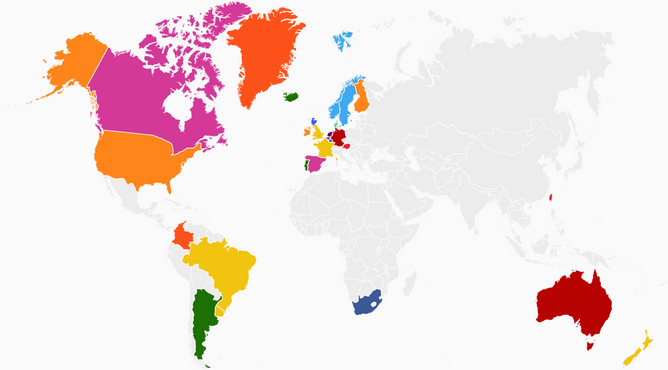World Economic Forum
The First Step toward Solving Bigger Ills of Homophobia

Source:Liang Jun Le
“Gay people, we will not win our rights by staying quietly in our closets,” says Harvey Milk, one of the first openly gay elected officials in the United States. With the 40th anniversary of his assassination recently behind us, there still is much we can learn from him.
Views
The First Step toward Solving Bigger Ills of Homophobia
By Simon Freakleyweb only
As many workplaces, and even entire industries, continue to work on building inclusive and diverse environments, I am reminded of Harvey Milk, one of the first openly gay elected officials in the United States. With the 40th anniversary of his assassination recently behind us, there still is much we can learn from him.
Milk was elected to the San Francisco Board of Supervisors in 1977, following a tenure as a political spokesperson for the city’s LGBTQ+ (then known as LGB) community and founder of a business association of predominantly LGBTQ+ merchants.
Once in office, Milk supported LGBTQ+ rights, notably sponsoring an anti-discrimination bill and opposing a ballot initiative that would have mandated the firing of gay teachers in California public schools. He championed inclusive policies for other marginalized groups as well, including women (particularly working mothers) and minorities.
 A thank you note on a bust of LBGTQ+ rights pioneer Harvey Milk. (Image: Reuters/Elijah Nouvelage)
A thank you note on a bust of LBGTQ+ rights pioneer Harvey Milk. (Image: Reuters/Elijah Nouvelage)
Milk was visionary. He recognized the importance of being seen, and the crucial role visibility could play in changing widespread discriminatory attitudes.
There remains much work to do. In 73 countries homosexuality is still considered a crime, in some places punishable by death.
In the US, there still is no federal law barring employment discrimination on the basis of sexual orientation or gender identity, and varying state laws make it possible for such discrimination to persist.
In addition, according to a leaked memo obtained by the New York Times in October, the US Department of Health and Human Services is considering narrowing the definition of gender – a move that could end the federal recognition of more than a million transgender people.
What we can learn from Milk, though, and what the recent transgender-rights #WontBeErased movement further highlights, is that visibility helps combat discrimination.
 Countries where same-sex marriage is legal (Image: Statista)
Countries where same-sex marriage is legal (Image: Statista)
Have you read?
♦ The 30-Year Crusade behind Taiwan’s Same-Sex Marriage Law
♦ Taiwan Becomes the First Asian Country to Legalize Same-Sex Marriage
♦ Marriage Equality Boosted Employment in the US
In the US, the 2018 midterm elections served as a continuation of Milk’s legacy. More openly LGBTQ+ people were elected to public office this year than in any previous election – notably Colorado’s Jared Polis, the first openly gay elected governor in the US; Sharice Davids, the first lesbian Native American to be elected to the House of Representatives; and Kyrsten Sinema, the first openly bisexual US senator.
In other parts of the world, attitudes also are changing. This year, the World Health Organization reclassified “gender incongruence” so transgender people would no longer be deemed mentally ill.
In September, India’s Supreme Court unanimously decriminalized gay sex, and ruled that gay Indians be given all the protections of the country’s constitution. In 27 countries, same-sex marriage is now legal.
This progress is heartening. Further, it underscores the visibility Milk spoke about, a foundational component to achieving fair treatment for all.
Of course, we do not have to wait for new legislation or an election cycle to have an impact. Each of us can play a part in creating an inclusive world, and we can start in a place where many of us spend so many hours each day: the workplace. If we can foster an environment at work where everyone feels safe – physically and emotionally – to bring their whole selves to the office and be visible, we can each play a small part in affecting change on a much grander scale.
Milk said, “Gay people, we will not win our rights by staying quietly in our closets.”
At the heart of his statement is the importance of visibility, the first step toward solving bigger ills of homophobia and discrimination. It serves us all to remember his words and his bravery, as we build a better world for each other.
Original content can be found at the website of World Economic Forum: How do we solve LGBTQ+ discrimination? One word: visibility
This article is reproduced under the permission of World Economic Forum (WEF) and terms of Creative Commons Attribution-NonCommercial-NoDerivs 4.0 Unported License (“CCPL”). It presents the opinion or perspective of the original author / organization, which does not represent the standpoint of CommonWealth magazine.







